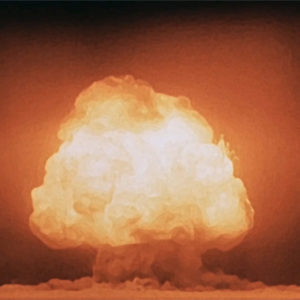Phil Harrison’s father, a member of the Navajo Nation, worked in New Mexico’s uranium mines. “I want to let people know that my father probably had an American Dream, but he never could get to the point where he could live that,” Harrison said. “He died from lung cancer at the age of 44 after working in the… mines — where there was no ventilation — for 20 years.”
“This is what we are living in — a legacy of mining and milling — it destroys our people, destroys our communities from contamination,” he said recently.
Harrison is one of the tens of thousands of people who would benefit from new legislation introduced by U.S. House of Representatives Assistant Speaker Rep. Ben Ray Luján to expand reimbursement for those exposed to radiation while working in — or living near — uranium mines in New Mexico.
For the first time, the bill will include individuals exposed to radiation who live “downwind” from the first-ever atom bomb test in 1945 at the Trinity test site in southern New Mexico. Trinity was the code name used for the world’s first nuclear-weapon detonation.
The Radiation Exposure Compensation Act Amendments of 2019 provides health and monetary compensations for individuals who were exposed to high levels of radiation that caused sickness, cancer and deaths in New Mexico and across the nation. The original legislation was passed in 1990; without legislative action it will expire in two years.
There are 35 co-sponsors, including Luján’s fellow Democratic members of the New Mexico delegation Reps. Deb Haaland and Xochitl Torres Small.
Referring to the first atomic blast on July 16, 1945, where the White Sands Missile range is now located, Luján said:
“This legislation will also bring attention to communities that we refer to as downwind and downwinders, areas like where the Trinity test site was in the community of Tularosa, were families were not given any warning.
“We need to make sure that we are correcting these injustices,” he said.
People in the mostly rural communities “don’t ask ‘if’ they’re going to die from cancer, they ask ‘when,’” says Tina Cordova, co-founder of the Tularosa Basin Downwinders Consortium.
“We’ve basically been left to deal with the consequences of [having been exposed] to radiation for 74 years,” Cordova told InsideSources. “The government has continued to characterize the area as remote an uninhabited — the area around the Trinity site — and in reality we know from the Census data that tens of thousands of people live in a 50-mile radius and hundreds of thousands of people live in a 150-mile radius.”
Cordova noted the amendments will finally help financially compensate the victims and their families and provide much needed medical assistance in their communities, “providing healthcare to those who are sick now and will become sick in the future.”
The Luján-proposed legislation also expands proof of residency requirements for the compensations to be consistent with Native American law, custom and tradition.
Beyond New Mexico, the amendments also include a congressional apology and compensation to people exposed to radiation in Idaho, Colorado, Arizona, Utah, Texas, Wyoming, Oregon, Washington, South Dakota, North Dakota, Nevada, Guam and the Northern Mariana Islands.
Luján placed great weight on the fact that many families from the mostly poor communities made the trek from New Mexico to the halls of Congress to persuade legislators of their plights.
“I want to thank everyone who traveled from New Mexico to visit with members of Congress — to help them understand what families are going through, what families are facing,” Luján said after introducing the legislation. “[There are] so many uranium mine workers and their families who have been diagnosed with cancer and other kidney diseases that were negatively impacted because of the work they were doing.”

